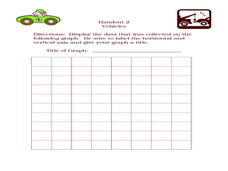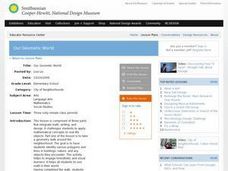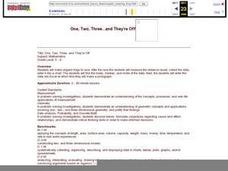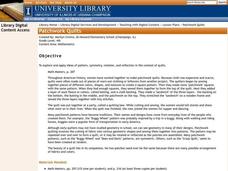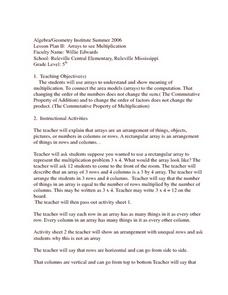Curated OER
Can You Name That Shape?
Learners use materials to build, investigate, and draw two-dimensional shapes (polygons). They combine the shapes they have built and draw from the pile to begin a round-robin activity to name and determine the attributes of a selection...
Curated OER
Show Me The Data!
Pupils create a bar graph. They will collect and organize data to turn into bar graphs. They create graphs for the favorite sports of the class, color of M&M's, and types of cars passing by.
Curated OER
Measuring with My Body
Third graders get into groups of two. Next, give each student a piece of butcher paper that is long enough for them to trace their entire body. One person lies down while their partner traces the outline of their body. Upon completion,...
Curated OER
2-D polygons
A hands-on activity uses the Zome modeling system, and helps young geometers either learn or review their knowledge of polygons. Pupils build as many different 2-dimensional polygons as possible: triangle, square, rectangle, pentagon,...
Curated OER
Our Geometic World
Students walk around the neighborhood and identify various polygons and lines in buildings, nature and other objects. They design a building using various geometric patterns, shapes and lines. Students complete a descriptive writing of...
Curated OER
Order Numbers On a Number Line
Fifth and sixth graders study the use of a number line to add integers and they observe a teacher demonstration of how to add integers on a number line. Afterward, they construct a number line and use the number line to solve addition...
Curated OER
Shapes and Colors All Around
Students tour their school in a scavenger hunt to find primary colors and two and three-dimensional shapes. Students take digital pictures of the colors and shapes they find and create a class book of the pictures.
Curated OER
One, Two, Three...and They're Off
Students make origami frogs to race. After the race they measure the distance raced, collect the data, enter it into a chart. They then find the mean, median, and mode of the data. Next, students enter this data into Excel at which time...
Curated OER
One Good Turn Deserves Another
Young scholars make observations about shapes and 1-, 2-, and 3-dimensional objects. They conduct observations and make predictions regarding transformations of simple geometric shapes. They identify shapes that occur in household items.
Curated OER
Geoboard Squares
Students create squares of different sizes on a geoboard. They find and describe a pattern. Students use the pattern to determine the number of squares possible on a 10-by-10 geoboard. They create squares with a horizontal base (and...
Curated OER
Traveling aroud Our Town
Students are asked to describe to a partner how he or she walks to school or the bus stop. They are shown on the overhead an one-inch grid paper, and at the intersection of two lines on the grid paper, students are shown a house and...
Curated OER
Count The Letters
Students perform activities involving ratios, proportions and percents. Given a newspaper article, groups of students count the number of letters in a given area. They use calculators and data collected to construct a pie chart and bar...
Curated OER
Rep Tiles
Third graders use pattern blocks of one shape at a time to try to create a similar shape. They compare the perimeter of the new figure with the perimeter of the original shape and look for a pattern. Students use the pattern to predict...
Curated OER
Decimals, Percents and Fractions
Sixth graders convert decimals and percents. They observe a teacher lead demonstration of converting decimals to percents and percents to decimals. Students practice what they have seen.
Curated OER
Patchwork Quilts
Fourth graders examine about traditional quilting patterns, the symmetry in such patterns, and practice creating patterns of their own. They design a quilting pattern, and groups make colorful "patches," of a pattern. They assemble the...
Curated OER
Angles
Fifth graders identify different angles according to its type that is determined according to taking a measurement of the degree. They also explore the vocabulary related to the concept.
Curated OER
Find the Shape
Students identify points on the coordinate plane using ordered pairs and also plot the ordered pairs on the coordinate plane. They also use properties of shapes to identify polygons such as triangles and quadrilaterals
(square,...
Curated OER
Tiling the Plane
Fifth graders use pattern blocks and triagular grid paper to reivew shape names, be introduced to the concept of a tiling of the plane, and determine which pattern blocks tile the plane. They are asked if they comprehend what a...
Curated OER
Investigating Nets and Polyhedra
Fifth graders create a net for a given polyhedron. They determine the corresponding polyhedron for a given net. Students investigate several polyhedra (cube, tetrahedron, and one of their choosing) and their corresponding nets. They...
Curated OER
It's a 3-D World Out There!
Students construct polygons. They identify attributes of three-dimensional shapes. Students name common three-dimensional shapes. They draw three-dimensional shapes, and sort three-dimensional shapes. Students use K'NEX materials sets to...
Curated OER
Can You Measure This?
Fifth graders design their own house, while also using problem-solving skills involving perimeter and area. They exchange houses with a partner and find the perimeter and area of the window, doors, and front side of the house.
Curated OER
Arrays To See Multiplication
Fifth graders examine multiplication. They construct arrays to demonstrate specific multiplication facts. They identify examples and non-examples of arrays. Students use counters to model the commutative property of multiplication.
Curated OER
Understanding Place Value
Fifth graders study place value. After forming teams, they play a game called, "Who Can Line Up the Number." Students observe numbers in expanded form and place representative digits in the correct order.
Curated OER
Order of Operations
Sixth graders perform the Order of Operations. Given various story problems, groups of students solve equations requiring division, multiplication, parenthesis, exponents and other mathematical processes. They discuss the order of...



